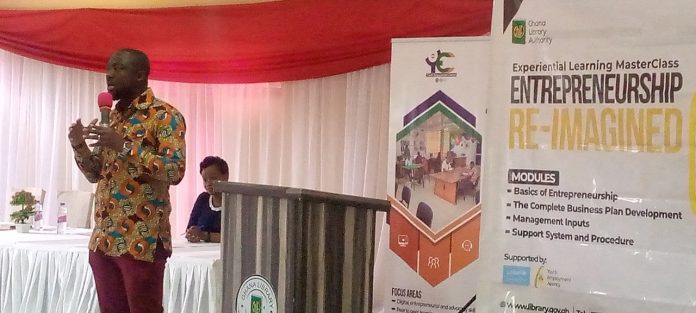In order to help Ghanaians bridge the knowledge gap in entrepreneurship, the Ghana Library Authority (GLA) has launched a program called Entrepreneurship Re-imagined.
Mr. Hayford Siaw, Executive Director of the GLA, has said that majority of firms in the nation are managed by individuals who have little to no awareness of the business dynamics and legal frameworks necessary to ensure their business’ success.
He made this statement during the two-day entrepreneurial workshop for about 300 people from the Eastern Region in Koforidua, when resource speakers from the Ghana Revenue Authority and the legal community walked the participants through different business models.
Mr Siaw outlined the four fundamental modules that make up the Entrepreneurship Re-imagined programme: Basics of Entrepreneurship; Comprehensive Company Plan Formulation, Management Inputs, and Support System and Procedure.
With those essential skills, he claimed that potential business owners might form their firms as legal individuals, develop ethical taxation procedures, and take use of some incentives in the ecosystem to expand their trade.
“The more knowledge you have, the more privileges you will have to do something for yourself. I therefore urge everyone to log on to www.library.gov.gh to find out what opportunities are available there,” he said.
According to Mr. Siaw, the Authority began the nationwide effort this year in order to connect Ghanaians to information resources through static library programs and mobile van services.
However, he continued, it had recently changed the focus of its operations to link Ghanaians through interactive leadership development workshops and online course platforms.
Participants were given an overview of tax payers’ rights and obligations, tax offences and penalties, tax clearance certificates, mandates of GRA, and the GRA Act 2009 by Mr. John Andoh, the Koforidia Area Head of Enforcement, GRA (Act 971).
Mr Sarkodie Baffour Awuah, a Legal Practitioner and Entrepreneur, who enlightened the audience on the legalities of setting up businesses, advised entrepreneurs to advance beyond the sole proprietorship type of business and form partnerships to enhance their activities.










